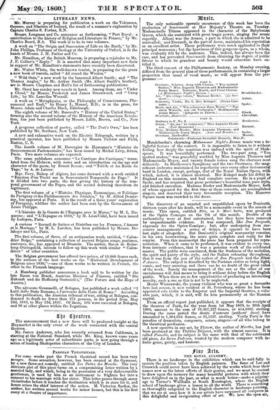The only noticeable operatic occurrence of this week has been
the production of Semiramide at Her Majesty's Theatre on Tuesday. Mademoiselle Titiens appeared in the character of the Babylonian Queen, which she sustained with great tragic power, singing the music superbly. Alboni was the Arsace, a part in which she is admitted to be unrivalled ; and Everardi in the part of Assur, maintained his reputation as an excellent artist. These performers were much applauded in their principal morceaux ; but the heaviness of this gorgeous opera, as a whole, was evidently felt by the audience. This, indeed, has always been the case, and has prevented Setniramide from obtaining the degree of public fa'vour to which its grandeur and beauty would otherwise have en- titled it.
The third concert of the Philharmonic Society, on Monday evening, differed from the general plan of these performances, in containing a larger proportion than usual of vocal music, as will appear from the pro- gramme :—
PART I.
Overture, Scherzo, Song with Chorus, " You spotted Snakes," Miss Augusta Thomson and Mademoiselle Jenny Meyer. Notturno, March, and Final Chorus.
(A Midsummer Night's Dream.) Mendelssohn. Air, " Du village voism," Madame Rieder. (Le Ser- ment,) Auber. Concerto, Violin, No. 8, Her R8mpel. (Scena Can-
tante.) Spohr. Recit. and Air, •• Wie sehmerzen diese Worte," " Nur einen Wunsch, nur ein Verlangen," Mademoiselle Jenny Meyer, (Iphigenie in Tauria.) Gluek. Overture, Anacreon. Cherubini.
PART II.
Sinfonia in F, No. 8 Beethoven. Scene, " Ah, me 1 he comes not," Miss Augusta Thom-
son. (Fair Rosansond.) Barnett. Trio, Madame Rieder, Miss Augusta Thomson, and
Mademoiselle Jenny Meyer. ,Azor and Zemira.) Spohr. Overture, Zauberjiiite Mozart. Conductor—Professor Sterndale Bennett, Mus.D.
Mendelssohn's charming Midsummer Nights Dream music was a de- lightful feature of the concert. It is impossible to listen to it without feeling how deeply the musician was imbued with the spirit of Shak- speare. It was beautifully performed. The two-part song, "You spotted snakes," was gracefully warbled by Miss Augusta Thomson and Mademoiselle Meyer, and twenty female voices sang the choruses most delicately. In Beethoven's Symphony and the two Overtures, the mag- nificent orchestra maintained its superiority over every other instumental band in London, except, perhaps, that of the Royal Italian Opera, with which, indeed, it is almost identical. Her Kompel made his debAt in England on this occasion, and had complete success. He is a pupil of Spohr, and has acquired that great performer's beautiful tone, pure style, and finished execution. Madame Rieder and Mademoiselle Meyer, both of whom appeared for the first time at these concerts, are accomplished singers, and deserved their very favourable reception. The Hanover Square room was crowded to the doors.


























 Previous page
Previous page